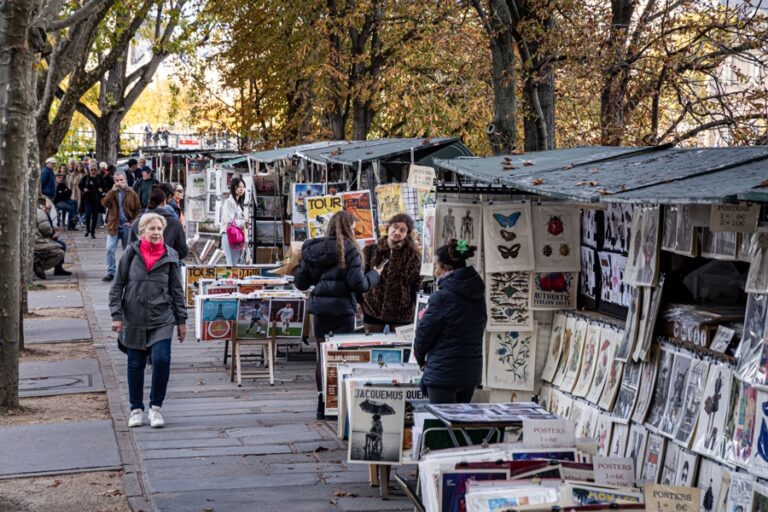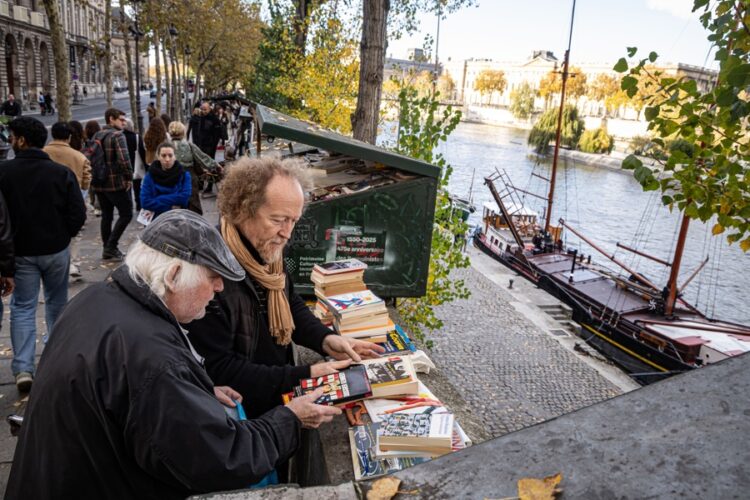
Riverside booksellers mark 475 years of Paris literary life
Paris, (EFE).
For nearly five centuries, the green boxes lining the banks of the Seine have stood as open-air temples to the written word.
Today, as small bookstores vanish across Paris, the city’s famed bouquinistes, sellers of second-hand and antique books, are marking 475 years of a tradition they fear may be among the last of its kind.

Every morning for the past 35 years, Jérôme Callais has unlocked his stall near the Pont Neuf, weathering rain, wind, and time with quiet pride.
“Small neighborhood bookstores are closing one after another,” he told EFE. “We have an economic model that allows us to hold on. I really think we will be the last small booksellers.”
A former musician who traded his double bass for stacks of paper, Callais now heads the Cultural Association of the Bouquinistes of Paris.

To celebrate their 475th anniversary, he and his fellow booksellers have organized a gathering this Friday by the Pont Neuf — inviting Parisians, tourists, and cultural figures to join them in honoring a living symbol of the city’s soul.
The idea, he said, came after he attended the centenary of Madrid’s iconic Cuesta de Moyano book fair. “La Cuesta de Moyano is treated as a national treasure, and we, in Paris, have the impression that we are treated as vagabonds.”

Callais described the trade as a kind of vocation, a sacerdoce, a priesthood of culture. Bouquinistes, he said, are “ambassadors of literature,” giving new life to forgotten books and offering readers rare finds that might once have become bestsellers had they been released at a better time.
Unlike bookstores, “here there’s no door to push. It takes a certain culture, a certain knowledge.”
Between books and souvenirs
While the trade is rooted in paper, Callais admits that parts of the tradition have been tainted by the influx of tourist souvenirs.

Along stretches near the Louvre and Saint-Michel, some stalls now sell keychains and tote bags instead of books.
“It’s what I call a necessary evil,” he said, conceding that many colleagues depend on such sales to survive. “But the bookseller who tries selling souvenirs is like the lion who has tasted human flesh, he can’t go back.”
Though city regulations prohibit such practices, enforcement has been weak, especially since the early 2000s, when institutional neglect left the booksellers without a clear voice at City Hall.

A centuries-old story The bouquinistes trace their origins to around 1550, when peddlers began selling books near Sainte-Chapelle and the Palace of Justice before moving to the Seine’s banks.
A century after Gutenberg’s press, these itinerant traders found their audience among scholars, jurists, and the city’s emerging readers.
Some 475 years later, despite the digital age and battles like the 2024 Olympic Games, when authorities sought to temporarily remove them from the riverbanks, they remain a defining feature of the French capital.
As Callais likes to recall, quoting writer Blaise Cendrars: Paris is the only city where a river runs between two rows of books.





